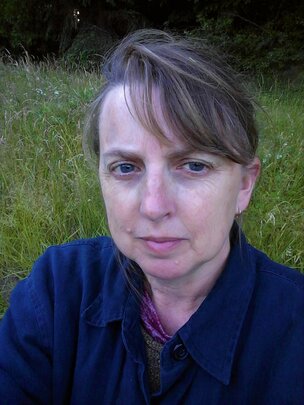
Annie Sheppard
Creative Nonfiction
Annie Sheppard’s essays can be found in Phoebe, McSweeney’s Internet Tendency, Fourth Genre, and The Pushcart Prize XLV, among others. She lives in Oregon.
One Peach
Last Friday evening, Henry brought home a peach. It was given to him by a customer, a woman for whom he’d replaced a bath fan. She came to him as he was putting his tools away, with the peach cupped in both hands. She held it out to him. “I am gifting you this peach,” she said.
“Gifting?” I said, at home in our kitchen.
“Yes,” Henry said. “Gifting.”
“She was a good one,” he added, meaning a good customer. Bad customers schedule his time and then hire someone else but don’t bother to tell him, or else they are chronically angry. Bad customers follow him around their house or shop or barn talking strident politics while he tries to unravel the hidden cause of the dead light switch or the alarming sparks that fly from the outlet or the mysteriously tripping breaker. It doesn’t matter which politics.
“She was about eighty,” he said. “Tranquil.” My husband values tranquility.
Henry and old people do seem to enjoy a special affinity. He appreciates their lack of hurry, that they are inclined toward function over form, and are usually frugal, so do not try his sympathies with spoiled, extravagant tastes. In return, they find him wonderfully capable—they genuinely value his problem-solving skills—witty, and reassuring. And so, now and then, an elderly customer will give him a gift: homemade sweet pickles, smoked fish, a little jar of homegrown weed, a bag of garden tomatoes, one peach.
“This will be the best peach you’ve ever eaten,” she said.
It came from her neighbor’s tree. He takes special care of his peach tree, she said. He waters it every day and talks to it, and in return the tree gives him these very good peaches. The best peaches you’ve ever eaten.
Imagine how tranquil it would be to wake up each morning knowing that your most important job today is to take loving care of one peach tree—just that one tree. Not one peach tree and one cherry, eleven apple trees and a sickly fig, a vegetable garden, a Delicata squash plant the sprinkler doesn’t reach, a thirsty little hellebore under the firs; three cats and seven hens; your squabbling family of inner children; your actual living grandchild, three years old, whose life, you worry, is already touched by too much anxiety; your aging mother, who, having alienated darned near everyone in her life including you now lives alone with the last of her marbles and though you feel both pity and responsibility toward her there is also a matter of rage (your own) to contend with; plus the young oak tree that you and your sister planted in memory of your father, planted forty miles away at the family cabin—a tree that is still too young to survive this frightening heat without regular watering. You agreed to do the watering because your forty miles is less than your sister’s three hundred, but the truth is you find it tranquil to water the oak tree you planted for your father. The truth is, if you could, you would water that tree—just that one tree—every day and talk to it.
Henry sliced the peach and shared it with me. We ate the slices with our taco salad and Rice-A-Roni and tequila shots. “This is a good peach,” he said.
“ Sometimes, when I think of writing, I can get a little grandiose. It feels like a noble pursuit: writing increases our capacity for tolerance and affection; or writing gives people hope, which is preferable to despair; or even that as creators, we are practicing for our future divinity.
But sometimes writing feels more humble, more like digestion. I’m still digesting the peach incident. Into the midst of a busy, messy, noisy life—with all its worries and inflationary excesses and its voracious, junkie mind forever feeding on itself―came one tranquil old woman, bearing a singular object.
Here, she said. Eat this instead. It’s very good. ”
